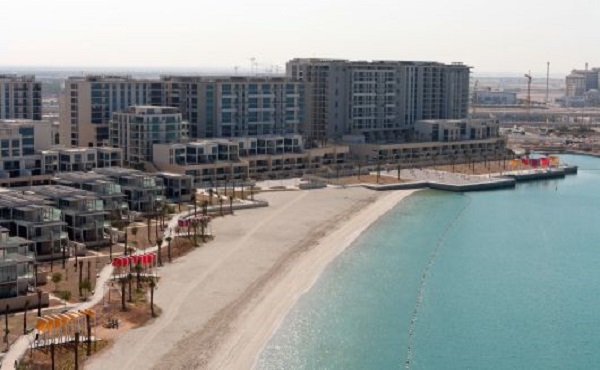China's real estate investors on a $200B global spending spree
In 2007 China's commercial property outflow was less than $1 billion. Now it exceeds $20 billion annually.
Individuals and corporations in China still have an estimated $200 billion to invest abroad.
Prominent commercial markets include Hong Kong, Australia, the U.K. and North America, particularly Los Angeles, Miami, New York City, San Francisco, Seattle, Toronto and Vancouver.

In 2015, Wendy Wei Mei Wu, a self-described billionairess housewife, bought a $5 million New Zealand island as a "toy." In 2016 a Chinese tycoon purchased a $270 million Hong Kong home, and HNA Group acquired a $6.5 billion stake in Hilton Worldwide Holdings. In 2017, CC Land Holdings shelled out $1.47 billion for London's "Cheesegrater" skyscraper.
Chinese buyers are increasingly impacting residential and commercial real estate markets globally. At the recent Shenzhen Real Estate Expo, representatives from two dozen companies, including iFeng.com, JLL and Leju, pitched real estate opportunities in Australia, Canada, Dubai, Greece, Malaysia, Spain, Thailand, Turkey, U.A.E., U.K. and the United States.
"The numbers are quite staggering if you look at the transaction volume and value of overseas purchases by Chinese," said James Fisher, director at Spacious, a Hong Kong-based online real estate platform. "You can see some market dislocation in areas that are popular with Chinese."
In 2016, Chinese outbound real estate investments increased by 56 percent, reaching $28.2 billion. China also became the largest cross-border real estate investor, overtaking the United States.
What's driving the charge
Fisher said many Chinese have an affinity for property. Additionally, a declining yuan, volatile domestic financial assets and competitive local property markets are spurring overseas purchases.
According to David Green-Morgan, global capital markets head of research at JLL, Chinese buyers "have access to huge amounts of capital that's been built up over many years. And they are able to deploy the capital quite quickly around the world."
And they are becoming much more savvy. As information flow increases, "they become more educated as an investor class," said Fisher. He added that with camera surveillance and communication technologies, Chinese owners can monitor their assets remotely in real time. "They're becoming more discerning," he said.
Before, Fisher noted, only ultrahigh-net-worth individuals bought overseas. Over the last five years, that has changed. "A much larger portion of the population is willing and able, through the growing middle class and the wealth of the nation increasing," he said.
Fisher claims that in the past, Chinese buyers acquired second homes so their children could study overseas or use it as a means to park cash. Now, though, they are focused on rental income and capital appreciation.
China's aging citizens also play a key factor. Many older residents are generating substantial returns on their primary residences, located in wealthy cities like Beijing, Shanghai and Shenzhen — and many are cashing out and downsizing, buying vacation homes in international locales that offer better air quality, food safety and quality of life. "There's a lot to be offered by overseas properties that's not available to these high-net-worth individuals in China," said Fisher.
Where, and what, they are buying
At the Shenzhen Real Estate Expo, marketing brochures included computer-generated images of faraway places with clear blue skies, perfectly manicured lawns, white sand beaches and alluring tourist attractions. "That was relatively unheard of 10 or 15 years ago. You didn't have people retiring overseas," Fisher said.
Prominent commercial markets include Hong Kong, Australia, the U.K. and North America, particularly Los Angeles, Miami, New York City, San Francisco, Seattle, Toronto and Vancouver. JLL's Green-Morgan said these are the most liquid markets and the most logical locations for new buyers.
Anbang Insurance, Country Garden Holdings, Greenland Holdings and R&F Properties are gobbling up condominiums, hotels and office buildings.
"For the institution, it's all about income, but also stability and security of that income," Green-Morgan said. After gaining international experience, they seek more opportunistic, return-enhancing deals.
Catering to the Chinese real estate investor
Many markets welcome Chinese buyers with investment visas, which grant residency in exchange for capital. These are intended to create jobs and often go toward real estate projects. Over the last decade, more than 400,00 Chinese invested the $500,000 to take advantage of the U.S. program.
Astute developers and agents are providing more Chinese-language material and Mandarin-speaking representatives. Some partner locally. Berkshire Hathaway recently joined forces with Juwai.com, China's largest international property portal.
Targeting Chinese prospects "is a no-brainer," Fisher said. "They've shown that they have the numbers and the cash to influence markets."
Beyond language, there are differences between buyers from China and other countries. Chinese corporations use greater equity initially before subsequently putting on debt.
"It's about securing the building first and then thinking about how to boost the returns," Green-Morgan said. In contrast, investors from other markets focus more on maintaining specific debt-equity ratios.
Chinese institutions also do more land-developmental deals, which Green-Morgan said is unique. Although some Chinese are searching for headline-generating trophy properties, "most of them are very disciplined in the way they underwrite the deals," Green-Morgan said.
Retail buyers are generally 100 percent cash buyers. According to Fisher, addresses with "8's," an auspicious number, and environments with feng shui have appeal, but these are ancillary considerations. To decrease maintenance and increase tenant interest, they want new properties.
More from Global Investing Hot Spots:
Australia's real estate boom has Wall Street wooing an unlikely business
Index giant Vanguard may have just done about-face on big investing position: Report
Investor alert: Here's why the gusher of billions into European stocks should continue
Buying new also guarantees there aren't unwelcome spirits, thought to bring bad luck or harm.
Spacious's Hong Kong property portal has a ghost search option, which highlights tragic events by location – suicide, murder, building collapse. Particularly with older generations, these are worrying. "It affects the demand and price. It's a material factor in the value of property," Fisher said.
For younger generations and foreigners unperturbed by these happenings, the app highlights discount opportunities. Fisher cited a rental that had a double murder. The property has experienced delays coming back on the market, was speculated to be at a 40 percent discount to comparables and impacted rental rates for other units in the building.
Recently, buying barriers emerged. To stabilize the yuan, Chinese authorities are constricting capital flight, particularly impacting individuals. Options exist to circumvent these restrictions, legal and otherwise, but Fisher said, "It's getting harder."
Not all capital pools are equal, though. Retail and institutional differ. Green-Morgan said state-owned enterprises and sovereign wealth funds are retreating from megadeals, but others are filling demand. Noting that first-quarter 2017 transaction volumes are up year-over-year, Green-Morgan said, "We see no let-up from the institutional investors."
In 2007 China's commercial property outflow was less than $1 billion. Now it exceeds $20 billion annually. According to Green-Morgan, individuals and corporations still have an estimated $200 billion to invest abroad.
According to Fisher, Chinese buying overseas is still in the early stages. "This is going to be a long-term trend."
— Joshua Bateman, special to CNBC.com. He can be reached @joshdbateman.





